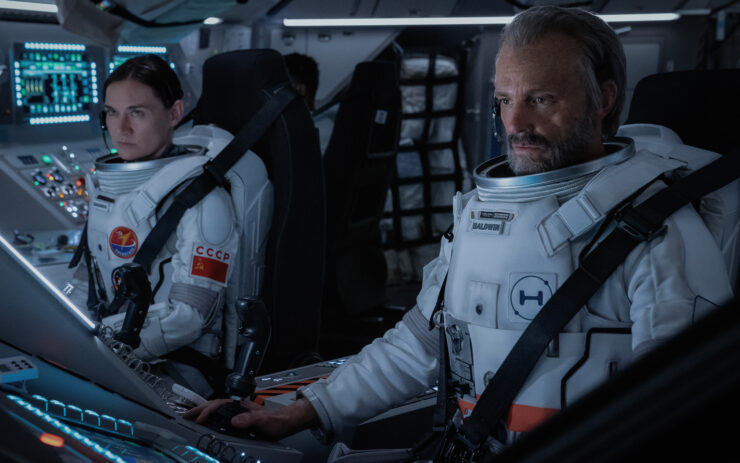Showrunner Ronald D. Moore characterizes For All Mankind as the alt-history foundation for Star Trek’s utopian future. It’s a bold but conflicted premise because while the show is packed with thrilling retrofuturistic ideas, its political worldbuilding grows less and less coherent with each new season.
[This post includes spoilers up to season 4, episode 1 of For All Mankind.]
Beginning in 1969, For All Mankind charts an alternate timeline focusing on the Space Race, hinging on a deceptively simple conceit: The Soviet Union lands the first man on the moon. This prompts the US government to bulk up its space program, training female astronauts in the early 1970s. In turn this leads to greater gender equality and (indirectly) to the early adoption of same-sex marriage in the late 1990s, after one of those women becomes the first openly gay US president. Another of NASA’s top astronauts is a Black woman, whose success signals a cultural shift in the aftermath of the Civil Rights Movement. In the background of the show’s interpersonal drama, we witness the evolution of a less racist version of America.
Over on the tech side of things, this elongated Space Race results in dazzling innovations including the elimination of fossil fuels. By the 1980s there are permanent outposts on the Moon, followed by crewed Mars missions in the ‘90s. Set in 2003, season 4 introduces an international Mars base where NASA heroes and blue collar workers live side by side.
Jumping forward a decade or so each season, For All Mankind offers a satisfyingly ambitious brand of speculative sci-fi. Yet the further it reaches toward that Star Trek-adjacent future, the more frustrated I become by its depiction of electoral politics, which often clashes with this pre-utopian vision of the late 20th century. In recent seasons this issue has graduated from casually implausible to downright nonsensical.
Season four opens with a montage of doctored archival footage and fictional news headlines. Recapping important events from the late 1990s and early 2000s, we learn that president Ellen Wilson (the former astronaut) was re-elected for a second term with George H.W. Bush as her VP. Gorbachev remains in power, but the Cold War has thawed. The Clintons got a divorce. Jerry Maguire and Cast Away are still popular movies in this timeline, alongside a blockbuster dramatization of the first mission to Mars. And in 2000, Bush Sr. runs for president and loses to Al Gore.
Despite my enjoyment of For All Mankind’s sci-fi soap opera vibes, this background worldbuilding is increasingly hard to swallow. In a timeline so radically different from our own, why are Bush and Gore still presidential candidates?
Along with being a clumsy approach to alt-history storytelling, these choices create an ugly subtext around which events can and can’t be changed. They suggest that certain real-life figures are somehow immutably destined for power—a more distasteful idea than the similarly implausible references to IRL pop culture. (Why, after all, would Nirvana and Jerry Maguire still be cultural touchstones in a completely different version of the ‘90s?)
The show’s presidential timeline offers an oddly conservative counterpoint to the wild twists of its spacefaring narrative. We begin with Nixon from 1969 to ‘74, followed by one term of Ted Kennedy, then two terms of Ronald Reagan. He’s succeeded by Democrat Gary Hart (1985-93), who lost out IRL due to a sex scandal. Then we get Ellen Wilson from 1993 to 2001, handing over the reins to Gore.
In other words, with the exception of Ellen Wilson, the show sticks to real-world candidates. Men whose careers were shaped by the events and values of our own timeline, and whose lives should be unrecognizably different in the world of For All Mankind.
As a sci-fi fan, I tend to assume that small changes should beget an outsized ripple effect. This is the foundation for numerous stories about branching timelines (including this one!), and it feels particularly relevant to electoral politics. Election results can turn on a dime, with success rooted in a specific cultural moment, and failure often resulting from bizarre flukes and unpredictable micro-scandals. Hell, an ill-timed rainstorm can alter turnout to a disastrous degree. So while it’s easy to accept Nixon’s role in season one, it strains credulity to imagine George H.W. Bush and Al Gore as major players in For All Mankind’s version of the ‘90s.
Buy the Book


Lost Ark Dreaming
In this universe the oil industry is dead, North Korea shares a Mars outpost with NASA, and the Soviet Union is still going strong in the 21st century. Realistically speaking, Bush and Gore should no longer be relevant. In fact the entire political landscape should look drastically different from what we see onscreen.
Ellen Wilson’s presidency ought to have marked a permanent departure from our own electoral timeline. Her season three arc was already a bold move, encouraging us to optimistically suspend our disbelief about America accepting a lesbian president in 1995. In fairness, For All Mankind has always been a wish-fulfillment fantasy. However this rose-tinted outlook really isn’t compatible with the persistent return of politicians from our own—far more conservative—timeline.
This leaves us with the question of why For All Mankind features such bewildering political worldbuilding. I highly doubt that sci-fi icon Ronald D. Moore fails to understand the logistics of branching timelines. So this must be a conscious storytelling choice, most likely intended to keep the setting as accessible as possible.
Despite literally being about rocket scientists, For All Mankind isn’t precisely aimed at nerds. It combines science fiction, historical drama and prestige soap opera programming, appealing to viewers who don’t necessarily consider themselves sci-fi fans. This necessitates a kind of “this far, but no further” attitude to the show’s role as an alt-history thought experiment.
It’s surprisingly easy to accept big, sweeping narrative choices like the demise of fossil fuels, or For All Mankind’s accelerated timetable for race and gender equality. But if the show began to extrapolate a more realistic departure from our own timeline, things would soon get a lot more complicated. They’d have to introduce new politicians, celebrities and social movements, spending time fleshing them out and illustrating their impact on the American public. And although those complications would fascinate some viewers, they’d confuse and alienate others. It’s more efficient to keep using real-world politicians and celebrities as a narrative shorthand, no matter how little sense they now make in context.
In For All Mankind’s version of 2003, Al Gore’s presidency is probably just meant to signal that we’re in a more eco-conscious version of America. It works better if you don’t overthink it. Although for viewers like myself, that’s easier said than done.
Gavia Baker-Whitelaw is a geek culture journalist and critic. She co-hosts the Overinvested film podcast, and co-edits the Hugo-nominated Rec Center newsletter. Find her on Bluesky (@Gavia) and X (@Hello_Tailor).










